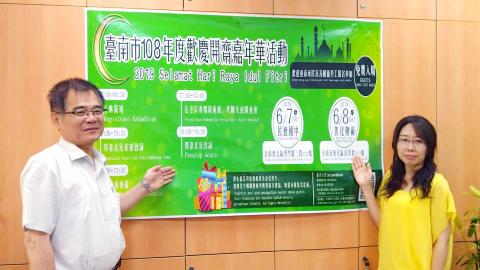The number of migrant workers in Taiwan reached 706,060 in April, with more than 90 percent of them from Indonesia, Vietnam and the Philippines, Directorate-General of Budget, Accounting and Statistics (DGBAS) data showed on Saturday.
More than 271,000, or 38.4 percent of migrant workers, were from Indonesia followed by Vietnamese (221,000, 31.4 percent) and Filipinos (154,000, 21.8 percent), the data showed.
Total migrant workers exceeded 700,000 for the first time in October last year, when there were 703,162.

Photo: Wang Han-ping, Taipei Times
The data showed that 259,144, or 36.7 percent, worked in domestic care and services, while 446,916, or 63.3 percent, worked in manufacturing, construction, agriculture and other roles.
Most migrant workers in the manufacturing, agricultural and construction sectors were in Taoyuan — more than 91,000 — while Taichung had 78,000 and New Taipei City 56,000, the data showed.
Taipei had the highest number working as carers or doing similar work with 44,000, while New Taipei City had 43,000.
Migrant workers reported as missing or working at jobs other than what they were legally contracted to do totaled 51,982, or 7.4 percent, National Immigration Agency data showed.
In related news, police in Taichung yesterday detained 10 people at the ASEAN Square shopping mall in Central District (中區) near the Taichung Railway Station.
Seven Thais — five men and two women — one Indonesian woman and two Vietnamese men were questioned about their employment and visa status, police said.
Control Yuan members last year said that officials from the Ministry of Labor, Ministry of Economic Affairs and Ministry of Health and Welfare should be held accountable for a lack of long-term planning and negligent supervision amid a surge in hiring of foreign workers without proper documentation.
“Reports of missing migrant workers have increased each year, creating public security concerns,” the Control Yuan said in a report.
“The percentage of migrant workers convicted of criminal activity has also risen, especially for assault, endangering public safety, narcotics activities, illegal logging and poaching,” the report said.

The Ministry of Economic Affairs has fined Taobao NT$1.2 million (US$36,912) for advertisements that exceed its approved business scope, requiring the Chinese e-commerce platform to make corrections in the first half of this year or its license may be revoked. Lawmakers have called for stricter enforcement of Chinese e-commerce platforms and measures to prevent China from laundering its goods through Taiwan in response to US President Donald Trump’s heavy tariffs on China. The Legislative Yuan’s Finance Committee met today to discuss policies to prevent China from dumping goods in Taiwan, inviting government agencies to report. Democratic Progressive Party Legislator Kuo Kuo-wen (郭國文) said

The Ministry of Economic Affairs has fined Taobao NT$1.2 million (US$36,900) for advertisements that exceeded its approved business scope and ordered the Chinese e-commerce platform to make corrections in the first half of this year or its license would be revoked. Lawmakers have called for stricter supervision of Chinese e-commerce platforms and more stringent measures to prevent China from laundering its goods through Taiwan as US President Donald Trump’s administration cracks down on origin laundering. The legislature’s Finance Committee yesterday met to discuss policies to prevent China from dumping goods in Taiwan, inviting government agencies to report on the matter. Democratic Progressive Party

Taiwan and its Pacific ally Tuvalu on Tuesday signed two accords aimed at facilitating bilateral cooperation on labor affairs, according to Taiwan’s Ministry of Foreign Affairs (MOFA). The governments inked two agreements in Taipei, witnessed by Foreign Minister Lin Chia-lung (林佳龍) and visiting Deputy Tuvaluan Prime Minister Panapasi Nelesone, MOFA said in a news release. According to MOFA, the agreements will facilitate cooperation on labor issues and allow the two sides to mutually recognize seafarers’ certificates and related training. Taiwan would also continue to collaborate with Tuvalu across various fields to promote economic prosperity as well as the well-being of their

Sung Chien-liang (宋建樑), who led efforts to recall Democratic Progressive Party (DPP) Legislator Lee Kun-cheng (李坤城), was released on bail of NT$80,000 today amid outcry over his decision to wear a Nazi armband to questioning the night before. Sung arrived at the New Taipei District Prosecutors’ Office for questioning in a recall petition forgery case last night wearing a red armband bearing a swastika, carrying a copy of Adolf Hitler’s Mein Kampf and giving a Nazi salute. Sung left the building at 1:15am without the armband and covering the book with his coat. Lee said today that this is a serious